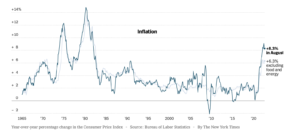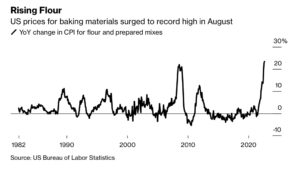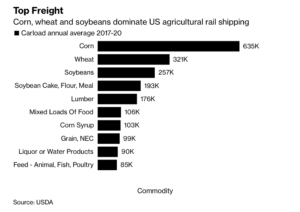A prolonged military conflict in the Middle East could potentially upend key commodity markets due to Iran’s control of the Strait of Hormuz, one of the world’s most important trade…
Food Prices Soar, as Some Railroads Ready to Halt Farm Product Shipments- While Putin, Erdogan to Discuss Black Sea Export Deal
Jeanna Smialek reported on the front page of today’s New York Times that, “Price increases remained uncomfortably rapid in August as a broad array of goods and services became more expensive even as gas prices fell, evidence that the sustainable inflation slowdown the Federal Reserve and White House have been hoping for remains elusive.

“Prices rose 8.3 percent from a year earlier, a fresh Consumer Price Index report released on Tuesday showed. While slightly better than July’s 8.5 percent, the rate was not as much of a moderation as economists had expected as rent costs, restaurant meals and medical care became more expensive.”
“The upshot is that inflation retains a surprising amount of underlying momentum, which is bad news for Fed officials,” the Times article said.
August CPI, #Food, https://t.co/7RYknZ6fXx pic.twitter.com/8KhzRE9DKs
— FarmPolicy (@FarmPolicy) September 13, 2022
More narrowly with respect to food costs, Rachel Siegel reported on the front page of today’s Washington Post that, “The government’s food index, for example, has risen 11.4 percent over the past year, the largest 12-month increase since May 1979.
August CPI, #Food at home, away from home pic.twitter.com/cjPiIrSFKt
— FarmPolicy (@FarmPolicy) September 13, 2022
“Food prices were up 0.8 percent from July to August.
August CPI- #Food at home pic.twitter.com/xlMNco3lAR
— FarmPolicy (@FarmPolicy) September 13, 2022
“Flour was up 2.2 percent over that span. Potato prices rose 2.5 percent. Butter jumped 1.9 percent, and canned fruit spiked 3.4 percent.”

Associated Press writer Christopher Rugaber reported on the front page of today’s Los Angeles Times that, “Nationally, the average cost of a gallon of gas has dropped to $3.71, down from just above $5 in mid-June. But grocery prices have continued to rise rapidly, jumping 0.7% from July to August. In the last year, they have soared 13.5% — the biggest 12-month increase since 1979.
“Chicken prices have jumped nearly 17% in the last year. And egg prices surged 2.9% just in August from July and are up nearly 40% from a year earlier.
“Worsening food inflation is a particular strain on lower-income families, more of whom have had to turn to food banks and other aid as inflation has worsened.”
In other news, Bloomberg writers Kim Chipman and Ryan Beene reported yesterday that,
US railroads are poised to stop shipments of farm products and other key goods starting Thursday as the industry braces for a possible labor strike that could cost the world’s biggest economy more than $2 billion a day.
“Norfolk Southern Corp. said it plans to halt unit train shipments of bulk commodities on Thursday ahead of a potential US rail worker strike the following day. The railroad also said it would stop accepting autos for transit at its facilities starting Wednesday afternoon. Other railways are likely to follow suit, according to one agriculture group.”

The Bloomberg writers explained that, “A halt to shipments of grains, fertilizer, fuel and other crucial items threatens to hobble the US economy at a time of rampant inflation and fear of a prolonged global economic slump. Food-supply chains are especially at risk as farmers are gearing up for harvest and need to get their supplies to customers. Crops are especially in high demand due to shortages from the war in Ukraine and weather woes across the globe.”
The Bloomberg article noted that, “Railways are no longer shipping ammonia, an important component of about three quarters of all fertilizer, because it would be dangerous if the hazardous material was stranded during a potential rail strike, according to the Association of American Railroads.”
And Reuters writers P.j. Huffstutter and Tom Polansek reported yesterday that, “Some U.S. railroads will start halting crop shipments on Thursday, a day ahead of a potential work stoppage, an agricultural association and sources at two grain cooperatives said on Tuesday, threatening exports and feed deliveries for livestock.
“With farmers starting to harvest autumn crops that are shipped to meat and biofuels producers, the shipping disruptions could add to already high inflation. Farmers also plan to add fertilizer to fields after the harvest, and shipments of fertilizer are being delayed.”
Washington Post writers Jeff Stein, Lauren Kaori Gurley and Tyler Pager reported on the front page of today’s paper that, “White House aides are looking at how to ensure essential products carried by rail — such as food, energy and key health products — could still reach their destinations, even in the event of a strike. Senior officials have looked at how highways, ports and waterways can be used to offset any damage caused, while also talking to top officials in the shipping, freight and logistics industries.
“President Biden was briefed on the matter Tuesday morning, after he called the carriers and unions on Monday to press them to accept a deal, a White House official said. Senior officials at the White House are now leading daily meetings with the Departments of Agriculture, Transportation and Energy and other top agencies about how to mitigate the impact.”
Also today, Wall Street Journal writer Jared Malsin reported that, “One of the only significant diplomatic breakthroughs in the Ukraine war—a grain export deal that helped lower global food prices—is under fresh pressure as Russian officials warn they are unhappy with the terms, raising the threat that Moscow could use it in its widening economic war with the West.”
The Journal article stated that, “[Turkish President Recep Tayyip Erdogan] and [Russian President Vladimir Putin] are set to discuss the future of the grain deal on the sidelines of a summit in Uzbekistan of the Shanghai Cooperation Organization, an international body dominated by Russia and China, Turkish and Russian officials say. Last week, the Turkish leader suggested the deal could be used to better boost exports of Russian products as well.”





